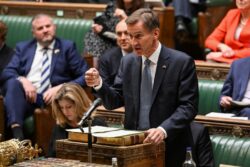Chancellor of the Exchequer Jeremy Hunt spoke about the triple lock in the Autumn Statement at the House of Commons. (Picture: UK Parliament/Jessica Taylor/Handout via REUTERS)
Chancellor Jeremy Hunt has recently announced the government’s Autumn statement in the House of Commons after warning he would have to take decisions of ‘eye-watering difficulty’.
The fourth Chancellor of the Exchequer the UK has seen in 2022 is making changes to various government fiscal priorities, including increasing the minimum and living wage, raising the benefit cap, and another round of cost of living payments to the most vulnerable.
The news comes after the Bank of England revealed the UK is almost certainly already in a recession, with GDP falling and interest rates being raised to 2.25% from 1.75% – the highest level since November 2008.
It also trails the economic turmoil that followed then-Chancellor of the Exchequer, Kwasi Kwarteng’s mini-budget, the fallout from which ultimately cost him and PM Liz Truss their jobs.
One of the most anticipated announcements in the Autumn statement was rumoured changes in the triple lock pension.
But just what is the triple lock pension, and what will happen to it?
Here is everything you need to know.
What is the triple lock pension?
The triple lock is a commitment that state pensions would rise by whichever was the largest of three figures – annual inflation, average earnings rises, or by 2.5%.
With this in mind, pension recipients could have expected a rise of more than 10% in their weekly payments next year as inflation reaches new highs – especially useful in times of post-pandemic uncertainty.
The triple lock pension returned this year. (Picture: Getty Images)
What has previously happened to it?
In September 2021, the former Department of Work and Pensions minister, Therese Coffey, announced a temporary suspension of the triple lock and that the government would decide on pensions based on annual inflation or by 2.5%.
Although the concept of a triple lock pension was a part of the Conservatives’ manifesto, the choice not to consider annual earnings was made to prevent those who were expecting to receive a pension ‘unfairly benefitting from a statistical anomaly’.
However, the triple lock returned earlier in the year.
What will happen to it?
Amongst the economic chaos that followed the mini-budget, there has been much speculation on the pension triple lock recently, with much of the former Chancellor’s economic plans ripped up by new Chancellor Jeremy Hunt.
Foreign Secretary James Cleverly was unable to give a firm commitment to keeping the triple lock as recently as mid-October.
However, it was confirmed by the Chancellor that the triple lock will remain in place.
To view this video please enable JavaScript, and consider upgrading to a web
browser that
supports HTML5
video
The Autumn statement itself states: ‘The State Pension will be uprated by inflation, in line with the commitment to the Triple Lock.’
‘The standard minimum income guarantee in Pension Credit will also increase in line with inflation from April 2023 (rather than in line with average earnings growth).’
‘This will ensure pensioners on the lowest incomes are protected from inflation and do not lose some of their State Pension increase in the Pension Credit means test.’
What is the current state pension worth?
The full, ‘new’ current flat-rate state pension (for those who reached state pension age after April 2016) is £185.15 a week.
The full, ‘old’ basic state pension (for those who reached state pension age before April 2016) is £141.85 per week.
MORE : Cost of living rises by more than 10% in a year – and food is up nearly 15%
MORE : ‘I’ve no idea how I’ll manage’: Disabled families pushed into debt by cost of living crisis
Follow Metro across our social channels, on Facebook, Twitter and Instagram
Share your views in the comments below
All you need to know on the current state of the pension triple lock.





